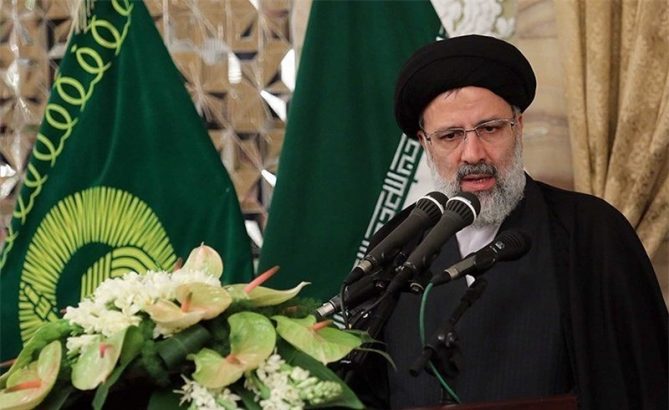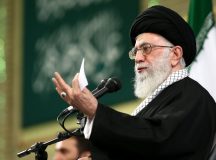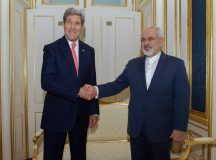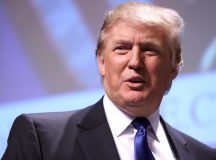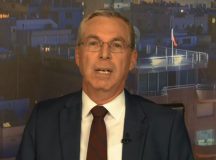On 13 July, Fathom’s deputy editor Samuel Nurding sat down with the Eurasia Group’s Henry Rome to discuss the state of play in the nuclear talks between the US and Iran in Vienna and to assess what impact Iran’s newly-elected President Raisi might have on the trajectory of the talks, as well as to explore the future of the nuclear agreement and Iran-West relations.
Samuel Nurding: Perhaps we can start with a quick summary of where the parties currently stand on the talks in Vienna for those who have not been following the weekly updates?
Henry Rome: The talks began in April. There have been six rounds since then, but they have been paused since the presidential elections. Essentially, it’s up to Tehran at this point to get its ducks in a row. The Iranians are meeting with representatives from the parliament, national security council, foreign ministry and officials from the new president’s office to decide next steps. In terms of where we are right now, the sides have agreed on the easy stuff: a pathway back to the JCPOA through the lifting of sectoral US sanctions in return for winding back most of Iran’s nuclear activity. But what’s left of course is the tricky stuff: which sanctions go and which ones remain, as well as how to achieve the equivalent of the one-year breakout time embedded in the JCPOA. There are also a number of maximalist demands the Iranians have thrown in, such as receiving guarantees that a future US President won’t withdraw from the deal, compensation for the US withdrawal in 2018 and more sanctions relief. So the general state of play is that the negotiators have made some progress, but as with many negotiations, the hard compromises are saved till the end.
SN: Has the election of President Raisi in June impacted the talks and likelihood of reaching an agreement?
HR: Not as much as people had assumed. There was an argument being made as we headed into 2021 that there was a window of opportunity in which the US and Iran could return to the JCPOA before the Iranian elections in order to capitalise on President Rouhani and his more diplomatically-minded outlook and team. That didn’t happen and that’s not surprising. The policy on an issue as important as the nuclear programme is ultimately decided by the Supreme Leader and reached by a consensus of regime elites. The general posture of the government, which is sceptical of the US and distrusting of its ability to keep its commitments, while generally inclined to return to the JCPOA, is the same under President Raisi as it was under President Rouhani. The reason why we don’t have a deal yet is because Tehran was content to wait till after the June elections in order to move forward. It didn’t want to move forward before and seem desperate. It wanted to see how much it could get from the US side, and it also didn’t want to upset the election campaign period, which was extremely important for the stability of the regime as well as talks about succession to Supreme Leader Ali Khamenei.
So what does Raisi mean? I think there will be a deal signed at some point later this year, because it still remains very much in Iran’s strategic interest to do so, but also in President Raisi’s political interest, given that he’s inheriting a country with a very weak economy and he will want to start his term on a more positive footing.
SN: The latest provocation by Iran is to use enriched uranium to start producing uranium metal. Is this latest violation by Iran of its JCPOA commitments more significant compared to the other steps taken before?
HR: It is quite provocative. As the E3 (UK, Germany and France) said, this is a step directly related to developing a nuclear weapon. It is part of a long-string of provocations the Iranians have carried out since mid-2019 and they have become more serious over time, especially in terms of the deployment of advanced centrifuges, the enrichment of uranium, as well as some R&D steps which have no purpose other than practicing and learning techniques in order to build a bomb.
Now, Iran is probably not actually building a bomb right now. What it is trying to do is build leverage and gain expertise that it could use in the future. The real risk for negotiations is that at a certain point, the collection of Iran’s irreversible gains in nuclear knowledge will mean that imposing only the JCPOA limits would be insufficient to achieve a one-year breakout time. At that point the US would demand additional steps from Iran to roll-back its nuclear programme beyond what is imposed under the JCPOA, to ensure the breakout time is a full year. So essentially, the leverage that Iran is gaining could boomerang. Iran may reach a point at which returning to the JCPOA becomes harder, while the US may feel it has no alternative but to demand more from Iran that it is prepared to give. So this is why we have seen comments on the US side noting that time is not unlimited. In short, the main risk is that Iran gains too much expertise to make returning to the JCPOA conditions politically possible for either side.
SN: You recently co-wrote a fascinating essay with Eric Brewer in about Iran’s real intentions in Vienna. You question the assumption that underpins the general consensus in Western governments, i.e. that Iran is desperate to re-join the JCPOA. Why might it not be in Iran’s interest to return to the agreement?
HR: Western governments and observers assume Iran wants to get back to the deal. One assumption is that the maximalist Iranian demands that I mentioned earlier will eventually fall away because they cannot be met by the US and that they are just a negotiating tactic. I think this is a correct assumption, but what if we’re wrong? What if Iran is really disappointed with the sanction relief under the JCPOA, and the leadership concludes that JCPOA re-entry absent these additional provisions is not worth it? So I think this is an important aspect for the conversation here that we should be honest about; the idea that Iran definitely wants to return to the agreement is based on several assumptions that may not pan out. We wanted to raise these concerns as well as some potential signposts if this were actually the case.
SN: The Iranian challenge is also evident in other sectors. At the end of June, the US attacked a pro-Iranian militia’s drone base on the border between Syria and Iraq. Since then, there has been a series of drone revenge attacks on American bases in Iraq. Is the Iraq theatre, or other regional developments, linked to the JCPOA talks, and if so, how?
HR: There is no doubt that the nuclear programme, the missile programme and the regional posture is all part of the broad Iranian challenge Western and regional governments have to confront. I’m not sure there is a link between a specific attack in the region and the talks in Vienna. If anything, the nuclear talks have been quite insulated from outside events. For example, there have been one, maybe two, Israeli-linked attacks on Iranian nuclear infrastructure during the talks; and as you mentioned, the continued attacks on US military bases and on Iranian-backed militias, yet, the talks have continued. I expect that to remain the case as long as all sides see it as being in their best interests to return to the agreement.
But this insulation is not automatic, and that is another questionable assumption we wrote in the ‘War on the Rock’ piece you refer to: that both the US and Iran will pursue their interests in the region but won’t do anything that could inadvertently derail the Vienna talks. But there is a lot of risk here. The risk of an Iranian-backed militia causing several US military fatalities could make it politically difficulty for the Biden team to return to talks again. As time goes on and the negotiations drag out it just creates more opportunities for potential spoilers, either intentionally or accidentally.
SN: Have we had any indications of what President Raisi’s foreign policy will be? There is speculation that Iran may implement an energy strategy shift after focusing for too long on the West and Europe, instead looking toward the BRICS [Brazil, Russia, India, China, South Africa] group of countries, which may care less about the nuclear programme.
HR: This is a great question that doesn’t get enough discussion in Western circles. Let’s assume that there is a re-entry to the JCPOA and President Raisi is in charge of implementing Iranian policy. I think the contrast with his predecessor, President Rouhani, will be striking. After getting the nuclear agreement signed, Rouhani went on a European tour in early 2016 to drum up business, he campaigned on a daily basis domestically against the Revolutionary Guards to open up key sectors of the economy to foreign investment, and he tried to push through reforms of Iran’s banking regulations and anti-money laundering regulations. These were all part of a strategy to link the Iranian economy closer to the West to make Iran a more attractive country for investment. As we have seen, this didn’t pan out as Rouhani had hoped.
The Raisi strategy is going to be very different. He is not going to go to Europe to drum up business, nor is he going to fight the Revolutionary Guards to open up the economy and expand the role of international actors or the private sector. I think he is likely going to continue what the Supreme Leader calls ‘the resistance economy’, which focuses on trade with neighbours, as well as Russia and China, and will not pursue domestic reforms in order to attract Western investment. This will create a completely new dynamic for the West and regional actors. Why? Because when you consider the kind of offers the Biden administration can make to convince Iran to engage in follow-on nuclear negotiations after many of the JCPOA limits expire, and to offer Iran in such negotiations – like access to the US dollar, US economy and American firms investing in Iran – if these are no longer so important to Iran then the US has greatly reduced leverage over Iran. So there is a lot here that is going to affect the trajectory of US-Iran relations in the coming years and it’s not a good story.
SN: The E3 have issued countless statements over the last two years highlighting their concern about Iran’s nuclear development. Have the E3 made themselves irrelevant to Iran over the nuclear issue? Do you think the E3 will return to multilateral sanctions? Will Russia and China agree too?
HR: We’re still a long way off from the E3 returning to multilateral sanctions. If there were to be a collapse of nuclear talks and a redux to a decade ago, I would expect the E3 to persuade their European counterparts to increase economic pressure on Iran. But at this point that is a last resort option.
I don’t think the E3 are irrelevant, but their leverage in talks is diminishing. If President Raisi is not interested in European investment and EU economic ties, that makes what the EU has to offer to Iran in both carrots and sticks a lot less meaningful. Nevertheless, the E3 play a key role in convening all the JCPOA parties and in trying to bridge differences between the US and Iran, but at this point it’s really a US-Iran story.
SN: All the players in the region – Iran, Saudi Arabia, Israel and others – are looking on with interest at the possible connection between a return to the JCPOA and new withdrawals of US forces from the Middle East. Do you see any connection between the two and how may both developments impact the current balance in the region?
HR: I think they’re connected in the sense of being two sides to the same coin for the Biden administration. Ending the so called ‘forever wars’ in the region as well as asserting the importance of the role of diplomacy in addressing problems like the Iranian nuclear issue are pursued in the service of the long-sought pivot to the Indo-Pacific in addressing the challenge from China. The two policies you mentioned are key policy goals of the Biden administration and the message to the region from President Biden is that he really means this pivot to Asia and doesn’t want to get bogged down in regional conflicts that have entrapped his predecessors. Now there are a few risks here. One is the often-quoted line, ‘You might be done with the Middle East, but the Middle East isn’t done with you.’ The Hamas-Israel war in May was a good reminder of that, and many US Presidents have had to face the truth that letting regional conflicts go unresolved will eventually backfire. Another risk is that regional countries will interpret the US as abandoning the region, which could embolden US adversaries to go on the offensive.
SN: There has been a long debate about the Trump administration’s maximum-pressure policy and whether it worked, or might have worked had it been given longer. Based on the data, do you think it brought Iran back to the negotiating table? In other words, given what we know now, had Trump won another four years, do you think his policy would have made Iran renegotiate a more comprehensive agreement?
HR: I think the short answer is no. Granted, President Trump invited Iran on multiple occasions to renegotiate, and I think that was a genuine offer. We saw his engagement with North Korean leader Kim and his preference for personal diplomacy and the huge amount of confidence he had in his ability to make new deals. But he appointed people like John Bolton and Mike Pompeo who preferred the policy of regime change, so from Iran’s point of view not only did Trump tear up the JCPOA agreement and slap on Iran the most comprehensive US sanction regime against another country, but the US officials who were executing that strategy were also calling for a wholesale change in the Iranian government – so it basically offered very little ‘offramps’ to the Iranian government. Now if President Trump had been re-elected, I think a key question would be whether Pompeo or his coterie would still be in power because if not then there might have been some type of negotiations. I think the Biden administration is trying to dig itself out of the failure of the maximum pressure strategy, which severely damaged the Iranian economy but did not achieve in a sustainable way any of its main objectives.

